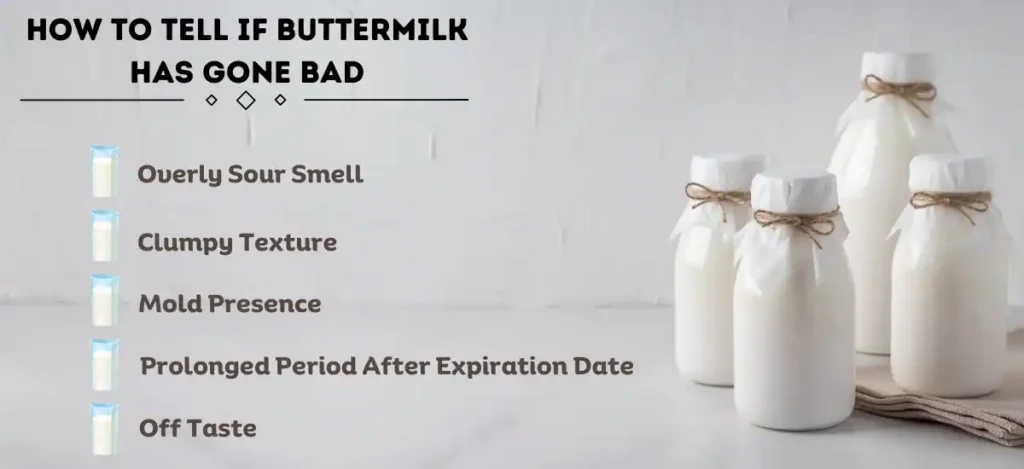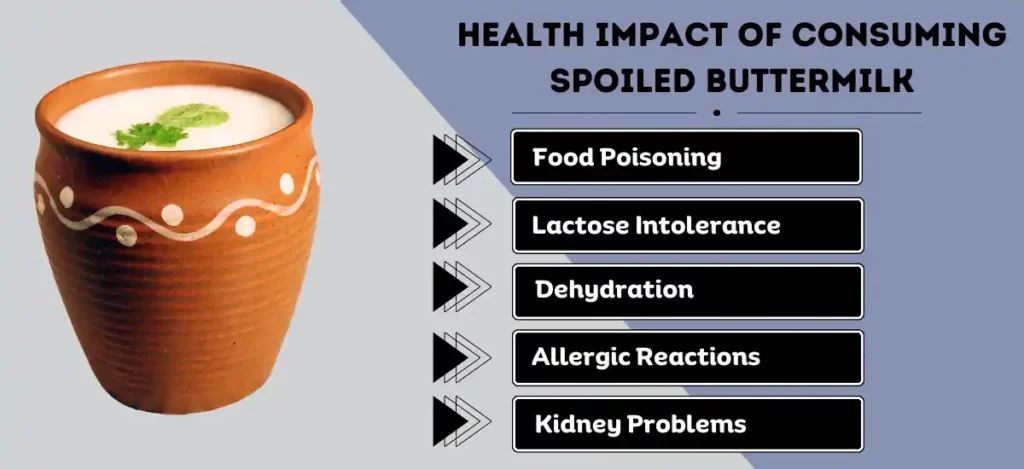Yes, buttermilk does go bad. Like any dairy product, it can spoil due to various factors such as exposure to heat, air, or contaminants. However, with proper storage, buttermilk can last quite a while. Unopened, store-bought buttermilk can last up to three weeks past the sell-by date if properly refrigerated. Once opened, it’s best to consume the buttermilk within 14 days for optimal freshness and quality.
On the other hand, homemade buttermilk, which lacks the preservatives found in commercial versions, typically has a shorter shelf life and should ideally be consumed within one week to 10 days. In both cases, always check the buttermilk for signs of spoilage like an unusual smell, change in texture, or an off taste before using it. If you notice any of these signs or if the buttermilk has exceeded its suggested consumption period significantly, it might be best to discard it to prevent any potential health issues.
The Role of Buttermilk In Cooking
Buttermilk is used in cooking and baking for various reasons:
- Tenderizing Agent: Its acidity helps tenderize gluten, making baked goods softer and fluffier. It’s perfect for making tender pancakes, cakes, or biscuits.
- Balancing Flavor: Buttermilk imparts a unique tangy flavor that can perfectly balance the sweetness of baked goods and desserts.
- Leavening Agent: When used with baking soda, buttermilk acts as a leavening agent, producing carbon dioxide and causing baked goods to rise and become light and airy.
- Creamy Texture: Buttermilk adds a rich, creamy texture to dishes. It’s often used in soups, salad dressings, and marinades to give them a creamy consistency.
- Rich in Nutrients: Buttermilk is low in fat and high in calcium, vitamin B12, and potassium, making it a nutritious addition to any recipe.
- Browning: The acid in buttermilk encourages browning, making it a favored ingredient in fried foods like fried chicken or fish.
How to Tell If Buttermilk Has Gone Bad

Identifying spoiled buttermilk is quite simple when you know what to look for:
- Overly Sour Smell: Buttermilk is naturally tangy, but if it gives off an unusually strong, unpleasant sour smell, it’s likely spoiled.
- Clumpy Texture: Fresh buttermilk has a smooth, creamy consistency. If your buttermilk has visible lumps, or the consistency has drastically changed, it could be a sign of spoilage.
- Mold Presence: Check for visible signs of mold or other discolorations. Mold spots in any color – green, blue, or black – indicate that the buttermilk is spoiled.
- Prolonged Period After Expiration Date: If the butter milk is opened or unopened but has surpassed its expiration date by a significant period, it’s safer to discard it.
- Off Taste: Lastly, if you’re still unsure, a small taste can confirm your suspicion. Spoiled buttermilk will have a distinctly sour, unpleasant taste compared to the usual tangy flavor.
Remember, if in doubt, it’s always safer to throw it out. Never consume dairy products if you suspect they are spoiled, as it can lead to food poisoning or other health issues.
Buttermilk Storage Tips & Tricks
Proper storage methods can significantly enhance the lifespan and quality of butter milk. Here are five simple and effective tips:
- Refrigerate Immediately: After purchasing butter milk, make sure to refrigerate it right away. It should be stored at a temperature below 40°F to prevent bacterial growth.
- Tight Seal: Always ensure the butter milk container is tightly sealed before storing. This protects it from absorbing the flavors of other foods in your fridge.
- Store At the Back of Fridge: Rather than storing butter milk on the fridge door, place it in the back where temperature fluctuations are minimal. This helps maintain its freshness longer.
- Avoid Cross-Contamination: Use clean, dry utensils when handling butter milk to prevent the introduction of bacteria that may cause spoilage.
- Use Within 2 Weeks of Opening: Once opened, butter milk should ideally be consumed within 14 days for the best flavor and safety.
Remember, these storage practices help maintain buttermilk’s freshness and quality, but they won’t indefinitely prevent spoilage. Always check for signs of spoilage before using.
Freezing Buttermilk: Yay Or Nay ?
When it comes to freezing buttermilk, the verdict is a confident ‘Yay!’ with some important notes to consider.
- Freezing is possible: Yes, you can freeze buttermilk. It’s a good option if you have a surplus that you cannot use within its standard fridge lifespan.
- Quality Changes: Freezing and thawing buttermilk may slightly alter its texture, causing it to become a bit grainy or separated. However, this doesn’t indicate spoilage or a decrease in its nutritional value.
- Ideal for Cooking: While the texture changes may make thawed buttermilk less appealing for straight consumption or in raw recipes, it performs just as well in cooked or baked dishes.
- Proper Freezing Technique: To freeze butter milk, pour it into ice cube trays or small, airtight, freezer-safe containers. If using ice cube trays, transfer the frozen cubes to a resealable plastic bag or container for longer storage.
- Thawing: Thaw frozen butter milk in the refrigerator, not at room temperature, to prevent bacterial growth. Shake or stir well before using to address any separation.
Homemade Buttermilk Vs. Store-bought: Does It Matter?
When it comes to the shelf life of butter milk, the source does matter. Here are a few points to consider:
- Store-bought Buttermilk: Commercial butter milk often contains added preservatives that extend its shelf life. Unopened, it can last up to three weeks past the sell-by date if properly refrigerated. Once opened, it should be used within 14 days for the best quality, though it may remain safe beyond this time.
- Homemade Buttermilk: Freshly made butter milk at home has a shorter shelf life because it lacks the preservatives present in commercial versions. Typically, homemade butter milk should be consumed within one week to 10 days.
- Storage Conditions: Regardless of the source, butter milk should always be stored in the fridge at temperatures below 40°F to prolong its freshness.
- Indicators of Freshness: Whether store-bought or homemade, always check the butter milk for any signs of spoilage like unusual smell, texture, or taste before using it.
Thus, while the shelf life does vary based on the source, proper handling and storage are crucial for maintaining the quality of both homemade and store-bought butter milk.
Health Impact of Consuming Spoiled Buttermilk

Consuming spoiled buttermilk can have several adverse health impacts:
- Food Poisoning: This is one of the most common consequences of consuming spoiled buttermilk. Symptoms can include stomach pain, vomiting, diarrhea, and fever.
- Lactose Intolerance Symptoms: Even if you’re normally not sensitive to dairy, consuming spoiled butter milk can trigger symptoms similar to lactose intolerance, such as bloating, gas, and diarrhea.
- Dehydration: Severe vomiting or diarrhea caused by food poisoning can lead to dehydration if not appropriately managed.
- Allergic Reactions: Some people may experience allergic reactions to the bacteria or mold present in spoiled butter milk. Symptoms might include itching, hives, or difficulty breathing.
- Kidney Problems: In extreme cases, certain types of bacteria that cause food poisoning can lead to serious kidney problems, particularly in people with weakened immune systems, the elderly, and children.
Frequently Asked Questions
Q1: Does buttermilk go bad?
Ans: Yes, like all dairy products, butter milk can go bad. It usually happens due to improper storage, exposure to heat, or contamination.
Q2: What does spoiled buttermilk smell like?
Ans: While buttermilk naturally has a tangy smell, spoiled butter milk will have a distinct, strong sour smell that’s different from its regular aroma.
Q3: How long does buttermilk last after opening?
Ans: Once opened, butter milk should ideally be used within 14 days if it’s store-bought and within a week if it’s homemade.
Q4: Can you freeze buttermilk and for how long?
Ans: Yes, you can freeze butter milk. It can be frozen for up to 3 months without significant loss in quality. However, the texture may change slightly upon thawing.
Q5: Can I use buttermilk past its expiration date?
Ans: If stored correctly, unopened store-bought butter milk can last up to three weeks past the sell-by date. However, it’s always a good practice to check for signs of spoilage before using it.
Q6. Does Condensed milk go bad?
Ans. Yes, condensed milk can go bad due to the presence of
moisture, leading to bacterial growth. So, always check the expiration date and
refrigerate it after opening to extend its shelf life. If it develops an off
odor, flavor, or unusual texture, discard it.
Q7. Does Almond Milk Go Bad?
Ans. Just like any other milk, almond milk can go bad too. Know more details
about the shelf of home-made almond milk and packet almond milk.
Q3. Does Evaporated Milk Go Bad?
Ans. Yes, evaporated milk does go bad. While it has a
longer shelf life compared to regular milk due to the evaporation process, it
is not immune to spoilage. Know the insights of evaporated milk expiration.
Related Post:
